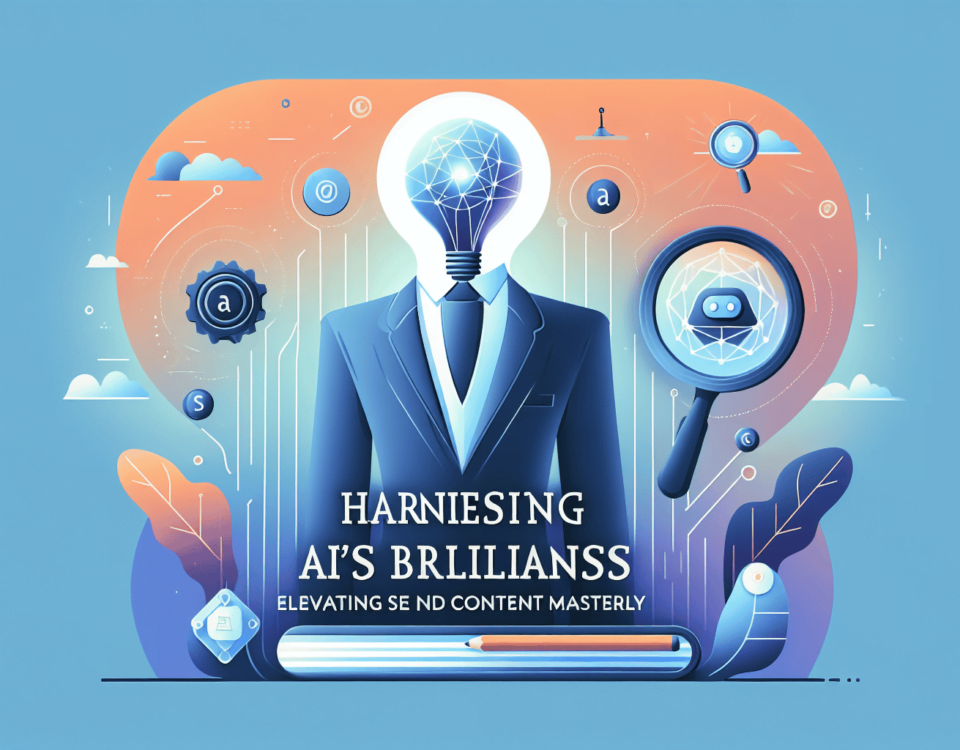Embracing Artificial Intelligence in Personalized Marketing
As we look toward the horizon of 2024, the adoption of Artificial Intelligence (AI) in marketing strategies becomes not only advantageous but necessary. AI facilitates highly personalized and predictive marketing tactics by harnessing vast data analysis capabilities. It is this very essence of personalization that is increasingly becoming the heartbeat of successful digital marketing endeavors.
Incorporating AI into content curation, precisely targeted advertising, and enhanced customer interactions will not just be a trend but a fundamental shift in how brands connect with consumers. Rather than replacing the need for human insight, AI will serve to complement it, empowering marketers to make informed decisions while maintaining the creative flair that truly engages audiences.
“Imagine a future where your shopping experience is so personalized, it feels like your favorite brands have an intimate understanding of your preferences.” – A Glimpse into AI-Powered Marketing
Adapting to the Surge in Voice Search Queries
2024 will witness a continued boom in the era of voice search, driven by devices like Alexa and Google Home. As voice search queries are projected to constitute a significant portion of all search engine interactions, the onus is on brands to optimize their digital content with a focus on natural, conversational language. This strategy not only improves the visibility of their offerings but also aligns with the evolving way consumers interact with technology.
By infusing content with conversational long-tail keywords, brands can harness the full potential of voice search SEO to reach wider audiences. The development of voice skills for virtual assistants is also becoming an indispensable tool within the marketer’s kit.
- 25% of all searches to be voice-activated by 2024
- Conversational keywords take center stage in optimization strategies
- Brands to develop voice apps for smart devices
Harnessing the Power of Social Commerce Integration
The amalgamation of social media and e-commerce, known as social commerce, is transcending the conventional boundaries between product discovery and purchase. Platforms are incorporating shoppable posts and simplified checkouts, establishing themselves as comprehensive retail environments. This blurring of lines allows for a streamlined and social shopping experience that appeals to modern consumers.
Moreover, the emergence of livestream shopping renders a dynamic and interactive facet to the consumer journey, facilitating instantaneous purchases during broadcasted events, and thus, poising social media to serve as virtual shopping plazas.
“Engagement and sales will increasingly converge as consumers look to social platforms not just for inspiration, but as prime shopping destinations.” – The Social Shopping Revolution
Leveraging User-Generated Content for Brand Trust
User-Generated Content (UGC) stands as a testimonial to a brand’s resonance with its audience. In a landscape saturated with advertising, the authenticity emanating from UGC offers a refreshing perspective that fosters trust and community. Brands encouraging the creation and sharing of user content will discover it’s a powerful tool in cultivating brand advocates and sustaining long-term relationships.
UGC is the digital equivalent of word-of-mouth marketing, its value magnified in a hyper-connected world. It is not just content; it’s a conversation, a story woven by the very fibers of the consumer experience. Organizations that tap into this resource will find themselves well-equipped to navigate a consumer-driven marketplace.
“Your customers are your storytellers, your evangelists, and your truth.” – The User-Generated Impact
Advancing Customer Service with AI-Driven Chatbots
The year 2024 will elevate the capabilities of chatbots and voice assistants to unprecedented levels. Fueled by AI, these tools will offer contextual and conversational engagement, behaving more like savvy sales associates than mere scripts. Customer service will become a pillar of the digital marketing strategy, as these advanced systems provide immediate, always-on support.
Training chatbots to handle intricate customer inquiries turns customer service into a sleek and efficient arm of the business, functioning as both guardian and guide in the consumer journey. This constant availability and assistance can dramatically elevate the overall user experience.
- Instantaneous support, 24/7/365
- Chatbots with contextual understanding
- Enhanced resolution of customer queries
Immersing Customers with Augmented Reality Marketing
The integration of Augmented Reality (AR) within marketing strategies will redefine the envelopment and interaction between consumers and products. With 3D models and immersive simulations, AR facilitates experiences that were once the realm of science fiction. Brands that invest in these technologies will not only captivate their audience but provide valuable, enriched understandings of their offerings.
AR marketing will extend beyond gimmickry to become a staple in sectors such as retail, where the “try before you buy” concept can be executed virtually, allowing customers to experience products within the context of their own environment.
“Augmented Reality is not just a new marketing tool, it’s a new reality for experiential decision-making.” – The AR Marketing Leap
Crafting Seamless Experiences with Omnichannel Marketing
Omnichannel marketing will manifest as the confluence of the customers’ virtual and tangible worlds, delivering consistently personalized brand narratives across all touchpoints. Marketers must weave together the multitude of platforms, devices, and physical locations to orchestrate a seamless customer journey.
The omnichannel approach isn’t just about being present; it’s about being present in alignment with the customer’s expectations and needs, predicting the next step in their journey, and ensuring each interaction is contiguous and delightful.
- Uniform branding across all channels
- Data-driven insights to predict customer behavior
- Synchronized online and offline experiences
Captivating Gen Z and Alpha Consumers with Fresh Strategies
Gen Z and Alpha consumers, with their digital nativity and distinct value systems, will dictate a new rhythm for marketing strategies come 2024. To captivate these generations, brands must embrace authenticity and engagement-driven content, such as short-form videos and behind-the-scenes looks, that accord with their preferences and social paradigms.
Collaborating with micro-influencers is a technique on the rise, as it resonates with the demand for genuineness and relatability. This cohort isn’t merely passive spectators of trends; they are co-creators, fostering developments and commanding a significant impact on the direction brands take.
“To engage the youngest consumers, you must speak their language, meet them on their terms, and echo their world view.” – Connecting with Next-Gen Audiences
Global digital ad spending is anticipated to reach staggering heights, reflecting the integral nature of digital marketing in the business framework. As brands prepare to step into 2024 and beyond, the synergy of these eight pioneering trends can lead them through the exciting and ever-evolving digital marketing terrain.




